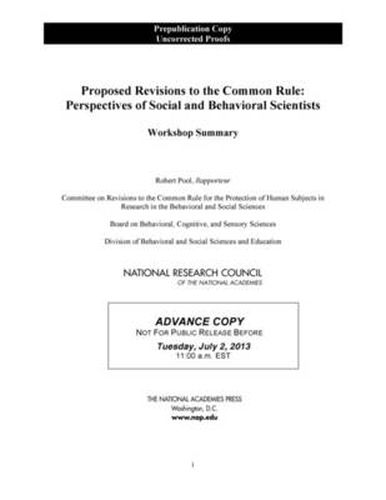Readings Newsletter
Become a Readings Member to make your shopping experience even easier.
Sign in or sign up for free!
You’re not far away from qualifying for FREE standard shipping within Australia
You’ve qualified for FREE standard shipping within Australia
The cart is loading…






On July 26, 2011, the U.S. Department of Health and Human Services issued an advance notice of proposed rulemaking (ANPRM) with the purpose of soliciting comments on how current regulations for protecting research participants could be modernized and revised. The rationale for revising the regulations was as follows: this ANPRM seeks comment on how to better protect human subjects who are involved in research, while facilitating valuable research and reducing burden, delay, and ambiguity for investigators. The current regulations governing human subjects research were developed years ago when research was predominantly conducted at universities, colleges, and medical institutions, and each study generally took place at only a single site. Although the regulations have been amended over the years, they have not kept pace with the evolving human research enterprise, the proliferation of multisite clinical trials and observational studies, the expansion of health services research, research in the social and behavioral sciences, and research involving databases, the Internet, and biological specimen repositories, and the use of advanced technologies, such as genomics.
Proposed Revisions to the Common Rule: Perspectives of Social and Behavioral Scientists: Workshop Summary focuses on six broad topic areas:
Evidence on the functioning of the Common Rule and of institutional review boards (IRBs), to provide context for the proposed revisions.
The types and levels of risks and harms encountered in social and behavioral sciences, and issues related to the severity and probability of harm, because the ANPRM asks for input on calibration of levels of review to levels of risk.
The consent process and special populations, because new rules have been proposed to improve informed consent (e.g., standard consent form, consent for future uses of biospecimens, and re-consenting for further use of existing research data).
Issues related to the protection of research participants in studies that involve use of existing data and data sharing, because the ANPRM proposed applying standards for protecting the privacy of healthcare data to research data.
Multidisciplinary and multisite studies, because the ANPRM proposed a revision to the regulations that would allow multisite studies to be covered by a single IRB.
The purview and roles of IRBs, because the ANPRM included possible revisions to categories of research that could entail changes in IRB oversight.
$9.00 standard shipping within Australia
FREE standard shipping within Australia for orders over $100.00
Express & International shipping calculated at checkout
On July 26, 2011, the U.S. Department of Health and Human Services issued an advance notice of proposed rulemaking (ANPRM) with the purpose of soliciting comments on how current regulations for protecting research participants could be modernized and revised. The rationale for revising the regulations was as follows: this ANPRM seeks comment on how to better protect human subjects who are involved in research, while facilitating valuable research and reducing burden, delay, and ambiguity for investigators. The current regulations governing human subjects research were developed years ago when research was predominantly conducted at universities, colleges, and medical institutions, and each study generally took place at only a single site. Although the regulations have been amended over the years, they have not kept pace with the evolving human research enterprise, the proliferation of multisite clinical trials and observational studies, the expansion of health services research, research in the social and behavioral sciences, and research involving databases, the Internet, and biological specimen repositories, and the use of advanced technologies, such as genomics.
Proposed Revisions to the Common Rule: Perspectives of Social and Behavioral Scientists: Workshop Summary focuses on six broad topic areas:
Evidence on the functioning of the Common Rule and of institutional review boards (IRBs), to provide context for the proposed revisions.
The types and levels of risks and harms encountered in social and behavioral sciences, and issues related to the severity and probability of harm, because the ANPRM asks for input on calibration of levels of review to levels of risk.
The consent process and special populations, because new rules have been proposed to improve informed consent (e.g., standard consent form, consent for future uses of biospecimens, and re-consenting for further use of existing research data).
Issues related to the protection of research participants in studies that involve use of existing data and data sharing, because the ANPRM proposed applying standards for protecting the privacy of healthcare data to research data.
Multidisciplinary and multisite studies, because the ANPRM proposed a revision to the regulations that would allow multisite studies to be covered by a single IRB.
The purview and roles of IRBs, because the ANPRM included possible revisions to categories of research that could entail changes in IRB oversight.